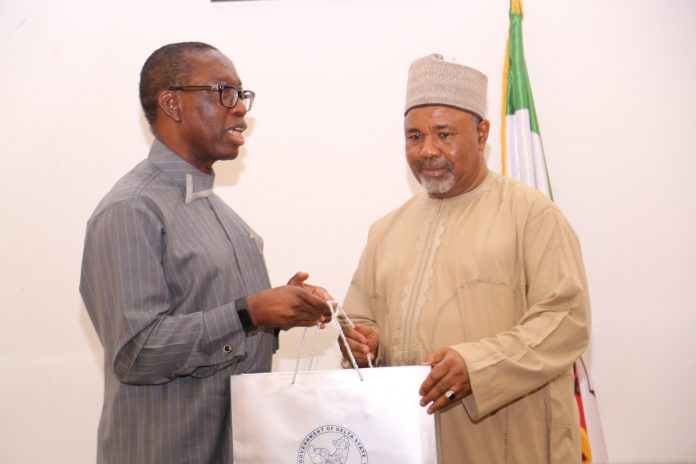Delta Governor, Senator (Dr.) Ifeanyi Okowa, said oil-producing states deserved more than 13 per cent derivation from the Federation Account and demanded the release of the money already accruing to the states under the derivation principles.
He made this known in Asaba when members of Post Mortem Sub-Committee of the Federal Accounts Allocation Committee (FAAC) led by Mr Kabir Mashi visited him.
The governor decried the lack of adequate implementation of the 13 per cent derivation policy, what had been in existence, stating that it was constitutional for the Federal Government to remit what was due for the states to them.
“We are hoping that in the near future we will be looking beyond 13 per cent which it is for now, and we actually believe that there is need to ensure that the money gets to Niger Delta states.
“As a state, we do understand that we are part of the federation and we pray and continue to work towards the unity of our nation.
“We also believe that it is important that for us to continue to show the kind of commitment we keep showing, every administration and finances of the nation must be done in such a way that there is fairness and justice.
“There should be an equitable approach to that and in so doing, the laws of the federation must be obeyed at all times and I guess that is why, in all fairness, this committee was put in place.
“As a state, we do understand that the oil resource as agreed by our nation is for the good of all but, very particularly, we have always insisted on the fact that since there is a constitutional provision for 13 per cent derivation, at all times we must apply that principle for the good of all.
“This makes it equitable, because until people come to understand the terrain, until the difficult terrains, particularly the creeks and riverside areas are being visited, people cannot completely comprehend the challenges that actually confront the people of the Niger Delta,’’ he said.
The governor added that the terrains made it difficult and burdensome for state governments to step in to try to develop infrastructure, adding that the situation was same for those who lived on land.
According to him, it is beyond the fact that oil processing leads to situations where environmental degradation occurs to the extent that our people can no longer farm or fish and their means of livelihood is actually distorted.
“So, we are truly glad that the Chairman of this committee and members are looking into all these issues.
“The Excess Crude Account is for the interest of all and we do not frown at the withdrawal of money from the excess crude account but, as we have always said, for any withdrawal from the account, first of all, we must apply the constitutional principle of deducting the 13 percent and send it back to those it belongs to.
“The rest of it becomes the federation’s money that can be applied in the agreement of all; for instance, the issue of withdrawal of one billion dollars to support the military agencies would not have taken place.
“As states from the Niger Delta area, we were not against it, but, it is only implied that in withdrawing that money, provisions must be made for the 13 per cent for the states, otherwise, it will look like we are disobeying the constitutional principles.
“It makes the Niger Delta states to contribute far beyond what all other states are contributing and that obviously is not fair and equitable and we will continue to advocate for fairness.
“It got to the House of Assembly to affirm the resolution that yes, we are supportive of the fact that money can be withdrawn but the resolution had to be passed in other states insisting that the constitutionally provided 13 per cent derivations should be deducted and returned to the states for fairness.
“This has happened in several other issues and it is important we start to look into it.
“Beyond all the things that we do in terms of infrastructure in the Niger Delta, we spend a lot of money to secure the facilities that belong to each and every one of us on behalf of all other states.
“We spend a lot of money far beyond what is expected – the military and other security agencies are doing their best but there is a lot more that we do as a state government in support of their services,’’ the governor explained.
He also said that there was a lot of work to be done regarding Nigeria National Petroleum Corporation (NNPC) and the monies it paid into the Federation Account, saying that most times, the states were not comfortable with the figures being bandied by NNPC and Federal Government.
“We do know that there could be slight fluctuations on a monthly basis but, we also understand that there should be no surprises when it comes to FAAC allocation.
“They should be able to declare what ought to be declared and any other deductions that are being done for any other purpose, then, the basic principles must be applied.
“But, first there must be total truth and truth that can be assessed and the whole nation is put in such a state that we can say we trust ourselves.
“At the end of evaluation and analysis, we expect a new leaf and all monies that are owed to be returned to various oil-producing states as we must impress on NNPC to do what is right to pay the monies owed because, as a nation, we must believe in justice, fairness and equity.
“We will stand strong and there should be no room for doubt because that will only bring weakness which as a nation we do not need,” the governor stressed.
Earlier, Mashi had said that members of the sub-committee were in Asaba for a meeting to review the benchmark used for monthly transfer of Excess Crude, PPT and Royalty Account.
“The assignment arose as a result of complaints made by members from the oil-producing states on the transfers and withdrawals from the Excess Crude Account without removing 13 per cent derivation to oil producing states,” he said.



